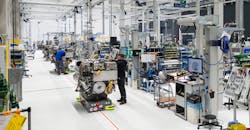Rolls Opens New Industrial Engine Plant
Rolls-Royce Power Systems opened a new assembly plant for its MTU Series 2000 marine engines, noting that the operation confirms a role for internal combustion engines in the transition to sustainable fuel usage. The new plant in Kluftern, near the MTU Engines base in Friedrichshafen, Germany, completes a two-year, €30-million ($32.6 million) development project for Rolls and its mtu business unit.
According to Rolls’ announcement, the Kluftern plant will be the site for assembling the 12-cylinder MTU Series 2000 diesel engines, creating space for assembly and shipping, and allowing the OEM to modernize the current Rolls-Royce Plant 2 in Friedrichshafen for assembly of the MTU Series 4000 engines.
Series 2000 engines are used as propulsion and energy systems for yachts, ferries, tugs, wind farm supply vessels, mining vehicles, and emergency power generators.
The new plant currently employs 110 workers.
Rolls detailed that the plant’s 1.2 MW-peak photovoltaic system provides green electricity, and e-charging columns ensure clean mobility solutions. An intelligent building control system alongside other equipment measures will promote energy-efficiency at the new operation.
The engine builder is working to develop engines that can run on a range of sustainable fuels, to replace fossil fuels and reduce carbon dioxide emissions. It has launched hybrid power systems for rail, shipping, and energy, as well as intelligent automation systems, which will be used to develop future propulsion technologies for commercial ships, yachts, land and rail vehicles, where electrification is not a long-term option.
